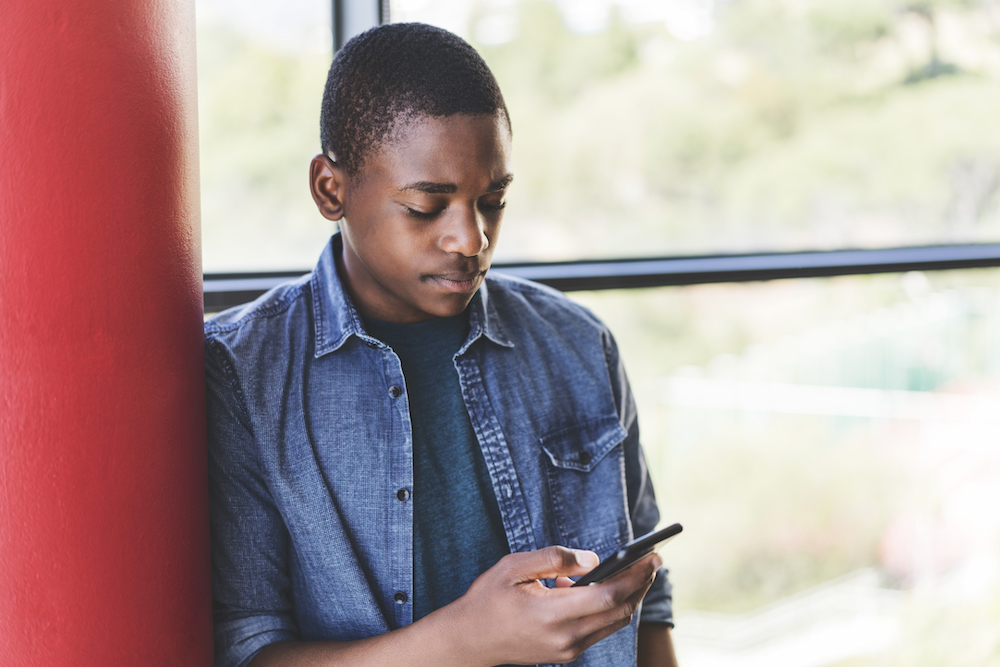Lesson 2: Strategies for Avoiding Scams
Before you start the lesson, make sure to read through the lesson overview and the lesson preparation. The Facilitator Guide can also help you prepare.
Lesson Objective
Participants will understand the risks of sharing personal identifiable information over unencrypted websites and Wi-Fi hotspots including how to help protect banking information in shopping applications and what precautions to take when completing a transaction in person.
Part 1
Marketplace scams
Although eligible items purchased on Marketplace from sellers and stores using checkout on Facebook are covered by Purchase Protection, local pickup items using person-to-person payment methods are not covered. Facebook does not offer refunds for any person-to-person transactions. Always be cautious when using person-to-person transactions to purchase Marketplace items, especially if an item needs to be shipped.
How do I buy and sell responsibly on Facebook Marketplace?
When shopping on Facebook, please make sure you are logged into the real Facebook website.
Here are some tips for buying and selling on Facebook:
- Be wary of gift card scams
- Communicate on Facebook
- Consider delivery options for Marketplace items
- Don't buy or sell recalled items
- Learn which items are not allowed on Facebook
- Meet in-person
- Protect your privacy
- Use online payment methods
- Avoid paying by bank transfer
- Verify the item
- Watch out for counterfeit items
There are two ways to buy and sell;
1. Checkout on Facebook from individual sellers : Instead of messaging the seller to arrange a transaction, buyers can purchase the item by tapping Buy Now or Buy with Shipping on the listing. These items are sold by individual sellers and may be covered by Purchase Protection, unlike local pickup.
2. Local pickup : Buyers can message the seller to arrange a transaction. Dropping off or picking up items helps you avoid interacting with people directly. Items purchased with local pickup aren't covered by Purchase Protection.
What’s the difference between checkout and local pickup?
You can learn more about the differences between buying something with checkout and local pickup.
We suggest following the guidelines from the Centers for Disease Control and Prevention (CDC) for how to stay healthy and help prevent the spread of coronavirus (COVID-19) while buying and selling. Be sure to check and follow local laws and directives that may be in place during this time.
If you're meeting someone in person, we recommend arranging your meeting in a public, well-lit area or a police station. Let others know where you're headed. Read our tips for buying and selling responsibly on Marketplace and meeting someone from Marketplace in person.
Part 2
Online dating and romance scams
The internet is a great place to meet other people who share your same interests and to potentially find a romantic partner. Online dating is popular with many age groups. Through these services people make connections that can lead to friendships, romantic relationships and sometimes marriage. However, if you choose to participate in online dating apps or websites, remember that anyone online could be saying they are someone who they are not.
Reasons you may want to be more careful with someone you met online;
- Their photos are stock or professional photos. These types of photos are often used by “catfish” and could actually be photos of someone else.
- They make you uncomfortable by immediately professing their love using strong language.
- They make you uncomfortable by pressuring you to leave the dating site and communicate with them through email or text messaging.
Staying safe while online dating
Meeting Online
- Share carefully
- Keep your identifying information private. Don’t include your last name, email, home address, phone number, work address, financial information or any other identifying information in your Dating profile or chat messages.
- Conduct a reverse image search
- For Facebook Dating: Report and block anyone who asks you to share this kind of personal information, information that could compromise your privacy, safety or security, or anyone who you feel is suspicious. We won't let the person know that you reported them.
Watch Out for Scams
- Scammers may try to use fake or compromised accounts to trick you into giving them money or personal information. If you've received a message that you believe is a scam, report the person instead of replying.
- Scammers might ask for money to cover travel, medical emergencies, hotel bills, hospital bills or visas. Remember that any online love interest that asks for money is likely a scammer. Learn more about keeping your account secure and other common scams.
Common Warning Signs
- Wants to leave a dating app immediately and use personal email or a messaging app to chat
- Claims to be in love very quickly to persuade you to talk with them
- Plans to visit, but claims that something bad happened and cancels plans
- Asks you to wire money or send gifts or gift cards
Don't Send Money
- Never respond to requests to send money, wire transfer money or make a donation. Stop communicating with anyone who attempts to pressure or trick you into revealing financial information.
- Contact your bank and local law enforcement right away if you think you've sent money to a scammer, and report anyone who asks you to send money.
Meeting In Person
Take your time
- People may misrepresent themselves and their intentions in their online dating profile, including their gender or age. This could lead to harassment or harm if you decide to meet them in person.
- Keep your communications within Facebook Dating, do your research and really get to know the other person before you meet for the first time.
Tips for staying safe while meeting in person
- Tell someone about your plans : Always tell a trusted friend or family member about your plans before going out, including the exact location of your date and when you expect to be back home. Consider making your first meeting within a group or bringing a friend along.
- Share your location : Share your GPS location with a trusted friend or family member while you're out.
- Meet and stay in public : When meeting someone for the first time, meet in a public place where other people are around.
- Familiarize yourself with the meeting spot : If possible, check out the meeting location ahead of time.
- Make sure your mobile phone is charged : Keep your mobile phone fully charged and with you in case of an emergency. You could arrange with a friend or family member to call you if you send them an alert text.
- Arrange your own transportation : Always arrange your own transportation to and from your date to make sure that you have control over when you arrive and leave. Never agree to be picked up at your home.
- Share personal information carefully : Never feel obligated to reveal identifying information like your home address or the location where you work.
If you feel uncomfortable or unsafe
If you or someone you know is the victim of a crime or is in immediate danger, contact your local law enforcement for help. If you ever feel pressured or uncomfortable, you can:
- End the date and arrange your own transportation home.
- Block anyone who makes you feel uncomfortable.
- Report anyone you think is suspicious.
Part 3
Other types of scams
Other types of scams include tech-support scams and medical identity theft.
Infected computer or tech-support scams
This type of scam typically happens through an unsolicited phone call—potentially from an unknown or unregistered number, email, or pop-up message. Someone claiming to be tech support for a real company will say that viruses have been detected on your computer or broadband router. Then they will ask you to follow instructions to save your data, or grant them remote access to your computer, which will allow them to install malicious software on your computer, access your bank or other accounts or steal your personal information. In some cases, they may ask for financial information or require you to purchase gift cards to regain access to your computer.
To avoid these scams, hang up the phone or ignore the message and then reach out to the company directly through channels listed on their website if you have any questions or concerns. If you suspect something after the remote connection with your computer has been set up, end the connection. If you can't, or you're in doubt, disconnect the network cable. Do not interact with the unsolicited message. If you think that your computer or other device has been infected with malware, immediately run a scan or seek professional help.
Medical identity theft
Scammers might use your stolen personal information to get prescription drugs, diagnostic tests and even medical operations or procedures and you may be required to cover the cost for people who steal your medical identity and use your insurance information for health care services. They could also use it to extort money from you.
Tips to avoid medical identity theft
- Be very cautious about giving out your health insurance or personally identifiable information to unknown companies or people.
- While medical providers may wish to take a photocopy of your insurance card, try to avoid allowing others to photocopy your insurance card or sign a blank insurance claim form.
- Always review your insurance statements/explanations of benefits (EOBs).
- Be careful when shopping for prescription drugs or other medical supplies online. If the price seems too good to be true, it probably is. Also be careful about where you’re shopping for prescription drugs or other medical supplies - you need to be confident that what you are purchasing and receiving is the product it purports to be, and not a counterfeit, which could be ineffective or even dangerous to use. Search for your country's official register of online pharmacies, if one exists.
Part 4
Who is a target for scams?
Anyone can be a target for scams so it is important to be alert while conducting financial business online. If you regularly click links, attachments and images within emails from unknown sources, this can put you at risk and let scammers know that you might be more susceptible to scam messages.
Additional strategies for avoiding scams
- If an offer looks too good to be true, it probably is.
- If a contest, job, or scholarship asks you to pay money upfront, don’t do it.
- Be cautious about giving out personal information to individuals or organizations that you don’t know and trust.
- Reach out to the person, organization, or charity offline directly to verify authenticity using the phone number you know to be authentic.
Discussion/Self-reflection
- Have you encountered any online scams in the past?
- How did you react?
- How would you react now?
Additional Resources
Congrats!
You've finished the lesson
Source:
This content is hosted by Meta and currently includes learning resources drawn from Get Safe Online and Digital Promise under a Creative Commons Attribution-ShareAlike 4.0 International license.



 Previous Lesson
Previous Lesson 




